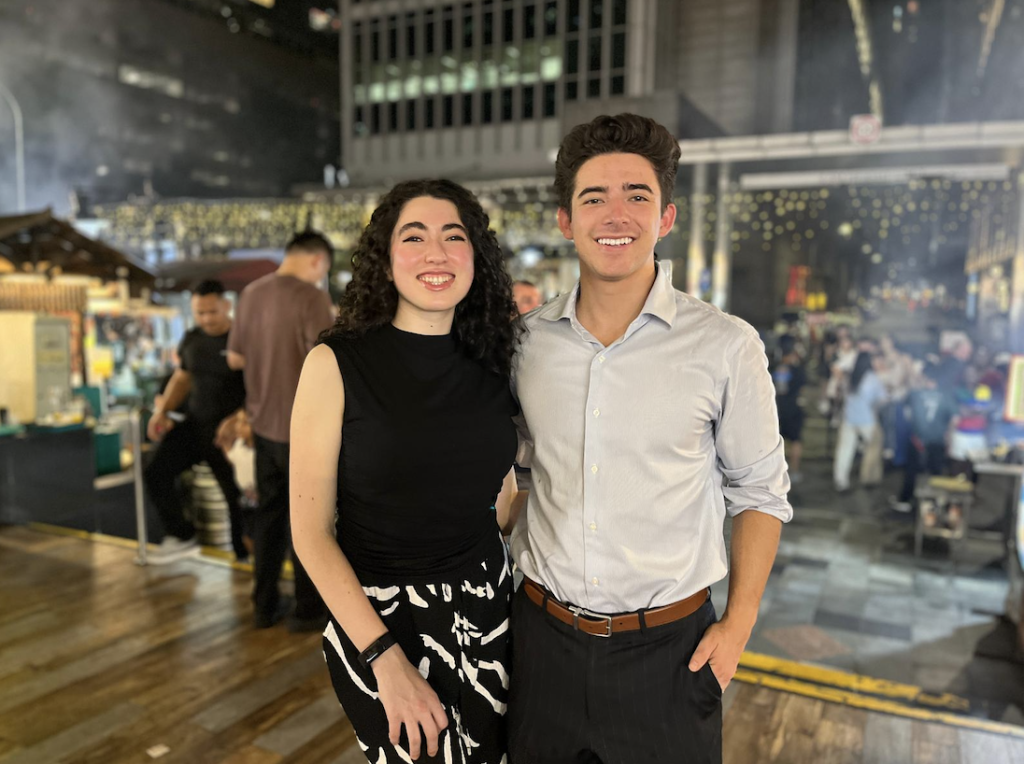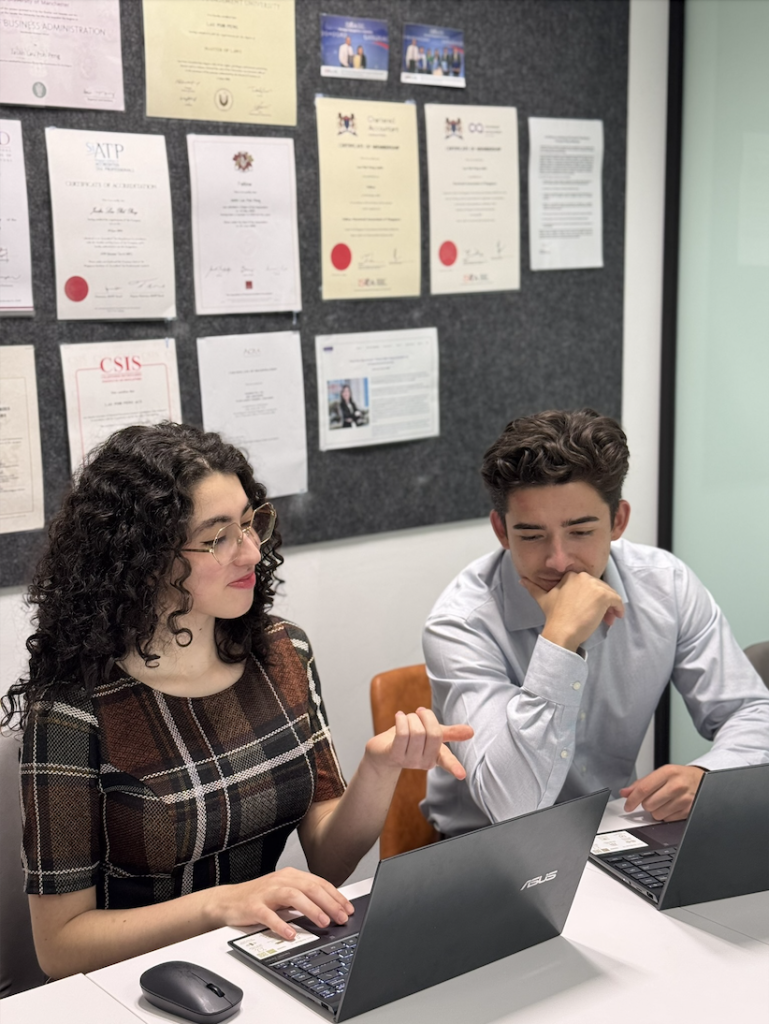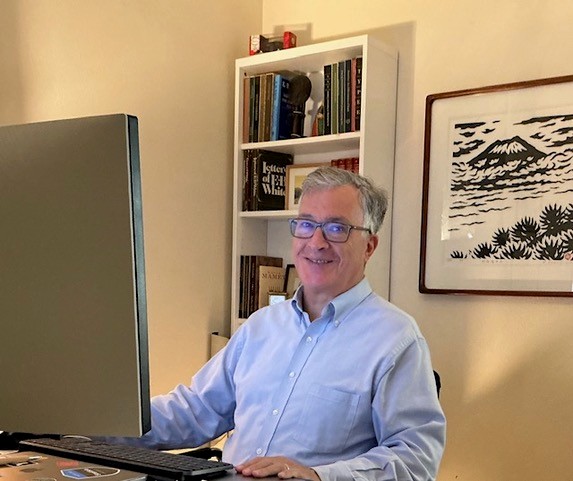Cultivating Cross-Cultural Talent: Learning from Lori and Caleb’s Global Internship Journey in Singapore
For most students, a summer internship is a stepping stone to gain hands-on experience and build a resume. For Lori Olga Agbabian, a business student and Caleb Benjamin Kawano, a mathematics major student from the University of California, Berkeley, their six-week internship with Advenz in Singapore became something much more a rare chance to live and work in a region they had never set foot in before, to challenge their worldviews, and to grow professionally in ways that surprised even themselves.
This was their first time in Asia. And what started as a professional internship quickly transformed into an experience of personal discovery, cross-cultural appreciation, and insights into what the future of work and the future of leadership could look like in a globally connected world.

(Photo: Lori)
Why Singapore?
When selecting from the many options offered through their global internship program, Lori and Caleb were clear: they didn’t want something familiar. They wanted to step outside their comfort zones. “There were many internship placements available in Europe,” Lori recalled. “But I was drawn to Asia. I’ve never been here before, and as a business major, Singapore stood out to me as a financial and business hub. Plus, I’ve been learning Mandarin since I was young, and I wanted to finally put it to use.”
Caleb shared a similar reasoning. Having already travelled across Europe for sports, he was looking for something different. “Singapore is often described as a bridge between East and West. I was curious to see how business is conducted here and how life differs or is similar to the U.S. It felt like a valuable way to broaden my perspective.”
Diving Into the Work
From day one, Lori and Caleb were entrusted with a significant project, analyze and map the company’s workflows, identify inefficiencies, classify tasks into value-adding and non-value-adding activities, and create a Process Playbook complete with improvement proposals.
Far from a superficial internship assignment, the task required interviewing multiple team members across different departments accounting, tax, corporate secretarial, and business development. It required them to understand each department’s function, observe real-time operations, and apply analytical thinking to identify opportunities for streamlining and integration, ending with a final presentation to the team.
“We weren’t just doing admin work,” said Lori. “We had to learn the business from the ground up, think like consultants, and propose real changes. It was intense but incredibly rewarding.”
Caleb added, “I didn’t know what a corporate secretary was before this, but now I’ve seen how all these different roles support the company’s operations. Seeing the big picture was eye-opening.”
Beyond their core project, Lori and Caleb were also involved in hosting company-wide events. They planned logistics and served as emcees for a corporate seminar, as well as participated in organizing the firm’s staff retreat. “Those were real highlights,” Lori said. “Being trusted to represent the company publicly, in another country, is something I’ll never forget.”

(Photo: Lori)
Experiencing Cultural Contrast and Connection
Before arriving, both had preconceived notions about Singapore. “I’d heard Singapore was super strict,” Caleb admitted. “Like, if you chew gum or jaywalk, you could be fined or arrested.” Lori echoed the same, recalling her concerns about accidentally breaking rules or offending local customs.
“But once we got here, we realized those fears were overblown,” she said. “People were warm, welcoming, and generous. And yes, there are rules but it’s more about mutual respect and order, not oppression.”
They also found unexpected joys in local customs. “The ‘chope’ culture blew my mind,” Lori laughed. “People leave tissue packets to reserve seats at hawker centers. Back at home, you can’t even leave your phone unattended. But here, there’s this unspoken trust. That really struck me.”
In the workplace, they noticed subtle but meaningful cultural differences. “Singaporeans are known to be more reserved, but in the business setting, they’re very direct and open,” Caleb said. “We didn’t feel out of place everyone made it easy to integrate.”
Lori added, “There’s a real balance between professionalism and authenticity. I expected a more rigid, uptight environment, but instead we found a lot of laughter, collaboration, and space for personal expression.”

(Photo: Lori)
Cross-Cultural Communication: Lessons in Language
Even though English is the working language in Singapore, Lori and Caleb discovered the nuances of communication across cultures.
“The accent took some getting used to,” Caleb shared. “Also, British English terms and local slang—Singlish sometimes caught me off guard. Words like ‘can’ or ‘lah’ have layers of meaning.”
Lori found the same challenge amusing. “In Singapore, people use a lot of initialisms like MRT, NUS, or CPF. At first, I had no idea what anyone was talking about. Also, the letter ‘H’ is pronounced ‘haitch’ instead of ‘aych’ small things, but they create confusion until you adjust.”
Despite these differences, they both adapted quickly and appreciated the efficiency and directness of local communication. “It’s like learning a new dialect,” Lori said. “But once you get the hang of it, it’s pretty fun.”
Redefining the Ideal Workplace
This internship was their first exposure to a full-time office environment. Prior to this, Lori had only worked part-time or held student jobs on campus, while Caleb had only completed other internships remotely.
“I imagined office life would be very transactional, come in, do your work, clock out,” Lori said. “But what we found was a company that values communication, mentorship, and team bonding. It felt human.”
Caleb added, “Leadership here wasn’t about authority, it was about support. People took time to explain things, involve us in meetings, and give us context. That mentorship was invaluable.”
They both agreed that an ideal workplace is one that balances structure with creativity, and productivity with inclusivity. “We need leaders who care not just about results, but also about people,” Lori said. “A good culture brings out the best in everyone.”
Discovering Themselves Along the Way
Their time in Singapore didn’t just teach them about international business it taught them about themselves.
Caleb realized he doesn’t want to become an accountant but he now knows he wants to run a business someday. “This experience showed me how different departments work together, how leaders think, and how companies grow. That’s the kind of environment I want to be part of.”
He also discovered a very practical preference: “I don’t want to commute too far to work,” he laughed. “That’s a deal-breaker.”
Lori, on the other hand, reaffirmed that she’s not a numbers person, but is deeply interested in operations, management, and business development. “I loved seeing how everything fits together,” she said. “Even though spreadsheets aren’t my thing, I now have a better understanding of how important accounting is and I want to keep expanding my knowledge, especially in tech solutions and process design.”
Both were surprised by how much they enjoyed being emcees for the company seminar. “I’m no stranger to public speaking or emceeing. Even so, standing in front of an audience of business professionals in a country I’d only been in for a month, and engaging with them, even getting them to laugh, was a special moment.” Lori said.
Advice to Companies Hosting Interns
As their internship wrapped up, Lori and Caleb offered thoughtful advice to companies planning to host interns, especially from overseas:
- Give interns real work. “We were lucky to have a project that was meaningful and aligned with the company’s goals. That made a huge difference,” said Caleb.
- Value their humanity. “Don’t treat interns like temp labor. Treat them as employees with potential,” Lori emphasized. “Make them feel welcome. Invite them to meetings. Let them ask questions.”
- Create learning opportunities. From sitting in on client meetings to being part of internal brainstorming sessions, exposure to real-world situations is the most valuable gift an intern can receive.
- Facilitate cultural exchange. “We appreciated that people were curious about where we came from,” Lori said, “but they also helped us learn about Singapore its customs, food, and people. That made the experience complete.”
Final Thoughts
When asked what they’d take away from their time in Singapore, both were quick to express gratitude.
“This wasn’t just another experience to add to my resume,” said Lori. “It was an unforgettable and unique experience that shaped how I think about work, culture, and what kind of leader I want to be.”
“It gave us perspective,” Caleb added. “And it reminded us that good work can happen anywhere, as long as you have the right people, purpose, and passion.”
From process maps to staff retreats, from hawker centers to boardrooms, Lori and Caleb’s journey in Singapore proves that the best internships go far beyond work they help young people find their place in the world.
Stay ahead with exclusive insights! Sign up for our mailing list and never miss an article. Be the first to discover inspiring stories, valuable insights and expert tips – straight to your inbox!




